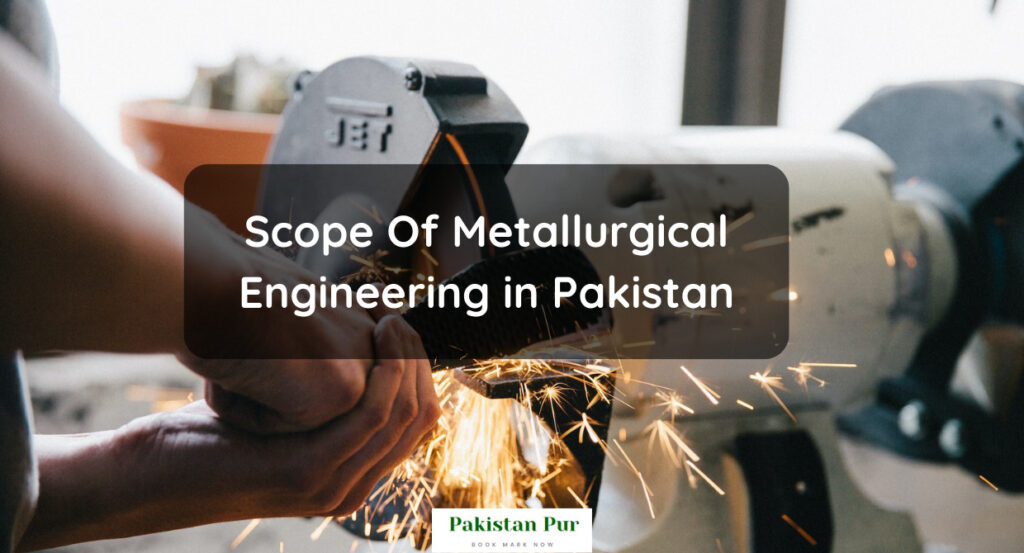
Table of Contents
The Scope Of Metallurgical Engineering in Pakistan is slowly growing in Pakistan but currently there are limited employment opportunities.
Metallurgical Engineering holds immense potential in Pakistan, offering a wide range of job opportunities across various industries. From the mining and extraction of metals to their manufacturing and utilization, metallurgical engineers play a crucial role in ensuring efficient and sustainable processes.
Industries, such as iron and steel, machinery manufacturing, aerospace, and research and development, are prime areas where metallurgical engineers find employment. The scope of this field extends beyond national boundaries, with promising prospects for international careers as well.
Let’s dive into the scope, the industries that employ BS Metallurgical Engineers, salary expectations for new graduates, and further study options for the BS Metallurgical engineers.
Industries for BS Metallurgical Engineers
Metallurgical engineers find employment in a variety of industries where their expertise in metals and materials is highly valued.
Here are some notable industries that frequently hire metallurgical engineers:
- Steel Manufacturing: Companies like ArcelorMittal and Nucor employ metallurgical engineers to refine, produce, and distribute metals.
- Mining and Extraction: Companies such as Freeport-McMoRan and Sterlite Copper require metallurgical engineers for their metal extraction processes.
- Automotive: Ford Motor Company and ZF Group employ metallurgical engineers to develop and improve automotive components.
- Manufacturing: Industries involved in metal fabrication and production, such as Worthington Industries, often hire metallurgical engineers.
- Materials Testing: Metallurgical engineers are employed in laboratories and testing facilities that specialize in metallurgical testing.
Read this guide to know about the universities offeriing BS Metallurgical engineering and the subjects taught in the degree.
Guide To BS Metallurgical Engineering In Pakistan 2023
Careers for BS Metallurgical Engineering
Metallurgical engineering offers a wide range of career opportunities for graduates. From medical technology to automotive design, this field opens doors to various industries.
Here are some potential career paths for individuals with a Bachelor’s degree in Metallurgical Engineering:
- Metallurgical Engineer: Playing a crucial role in refining metals and developing innovative materials, metallurgical engineers can find employment in sectors such as manufacturing, mining, and research.
- Materials Engineer: With their knowledge of materials properties and behavior, metallurgical engineers can work as materials engineers, exploring new materials and improving existing ones for industries like aerospace, electronics, and energy.
- Metallurgist: Metallurgical graduates can pursue careers as metallurgists, specializing in the physical and chemical properties of metals, analyzing their structure, and ensuring quality control in manufacturing processes.
- Design Engineer: Utilizing their expertise in materials selection and engineering principles, metallurgical engineers can work as design engineers, contributing to product development and optimization in various industries.
- Research Scientist: Metallurgical engineering graduates can pursue research careers as scientists, investigating material behavior, studying new alloys, and contributing to advancements in metallurgical processes
- Technical Sales Engineer: With their in-depth knowledge of materials, metallurgical engineers can work in technical sales, providing expertise and support to customers in industries such as manufacturing and construction.
It’s important to note that this list is not exhaustive, and opportunities may vary depending on location, industry demand, and individual interests.
BS Metallurgical Engineering Salary in Pakistan
According to a search on Indeed, the salary range for materials engineers in different cities of Pakistan is as follows:
- Lahore: Rs 70,000 – Rs 100,000 per month
- Karachi: Rs 35,000 – Rs 40,000 per month
- Islamabad: Rs 52,000 per month
Please note that these figures are indicative and can vary depending on the company, qualifications, and level of experience.
Additionally, Payscale provides some insights into the average salaries of metallurgical engineers in Pakistan. According to their data, the average salary for a metallurgical engineer in Pakistan is around Rs 800,000 per year.
It’s worth mentioning that these figures represent an approximate range and are subject to change based on market conditions, industry demand, and individual negotiations.
Further Education
After completing a Bachelor’s degree in Metallurgical Engineering, you may consider further education options to enhance your career prospects and acquire specialized knowledge.
Here are some potential paths for further studies:
- Master’s Degree: Pursuing a Master’s degree in Metallurgical Engineering or a related field can provide advanced knowledge and specialization within the discipline. This can open doors to higher-level positions, research opportunities, and increased earning potential.
- PhD: If you have a passion for research and want to contribute to the advancement of the field, pursuing a Doctorate (PhD) in Metallurgical Engineering could be an excellent option. A PhD can lead to academic careers, research leadership roles, and industry positions requiring expertise in highly specialized areas.
- Materials Science and Engineering: Considering a Master’s or PhD program in Materials Science and Engineering can broaden your scope beyond just metallurgical engineering. This interdisciplinary field explores the properties and behavior of materials, including metals, polymers, ceramics, and composites.
- Business Administration: Combining your technical knowledge with business acumen can open doors to management and leadership positions within the metallurgical industry. Pursuing an MBA or other business-oriented programs can equip you with the necessary skills to take on managerial roles or start your own ventures.
- Specialization and Certification: Apart from advanced degrees, you can also consider obtaining professional certifications or undergoing specialized training in areas such as corrosion engineering, welding technology, failure analysis, or quality control. These certifications can enhance your skillset and make you more competitive in the job market
It’s important to note that the specific educational path you choose will depend on your career goals, personal interests, and the availability of resources and programs in your region. Researching universities, consulting with professors, and networking with professionals in the field can provide valuable insights and guidance.
Leave a Reply